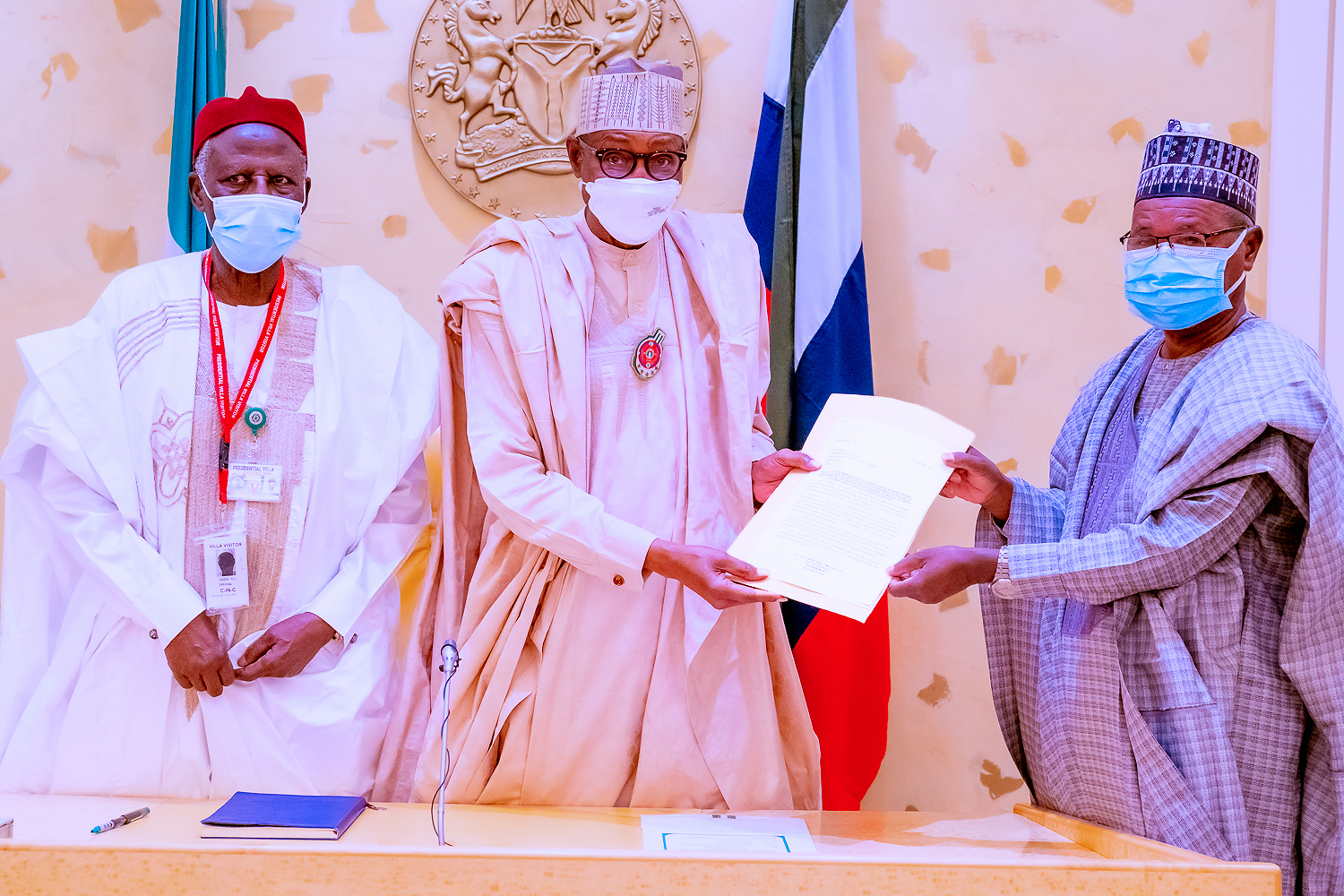Featured
Buhari Has Assented To More Bills Than Others – Lawan

President of the Senate, Ahmad Lawan, says President Muhammadu Buhari has assented to more than 84 Bills, the highest since the commencement of the Fourth Republic in 1999.
Lawan, who made the remark as a guest lecturer at the first Distinguished Parliamentarians’ Lecture Series, which was facilitated by the National Institute for Legislative and Democratic Studies (NILDS), said the projection was that the figure would be significantly higher before the end of Buhari’s tenure in 2023.
According to him, from the available data, President Olusegun Obasanjo signed a total of 82 bills into law between 1999 and 2006, President Umaru Musa Yar’Adua signed 38 bills into law between 2007 and 2009, while President Goodluck Jonathan signed 40 bills into law between 2010 and 2015.
He also asserted that the current National Assembly is the most successful in law making since the return to civil rule in 1999.
The Senate President said as of November 2021, about 2,500 Bills had been introduced in the National Assembly, 769 in the Senate and 1,634 in the House of Representatives.
He said the focus of the ninth National Assembly had been on legislations that were most likely to impact either on the democratic institutions, economy, security or the livelihood of Nigerians.
Speaking on the Electoral Bill, which has been transmitted to the president for possible assent, Lawan said once operational, the law would strengthen the electoral process and further reinforce public confidence in democratic institutions, especially the Independent National Electoral Commission (INEC).
He opined that the controversy generated by the Bill was due to the ever-increasing maturity of democracy.
”I dare say that the ninth Assembly has been the most successful in the area of lawmaking since 1999. We have broken many ‘jinxes’ and done many ‘firsts,’ overcoming traditional obstacles through consensus building and clever political brinkmanship.
“However, as I have repeatedly maintained, for us in the ninth Assembly, it is not so much the number of bills as it is quality. We have focused our energy working on legislations that have a realistic chance of being assented to as well as those that have the potential to impact most on the lives of Nigerians.
“For 20 years, the National Assembly had attempted reforming the petroleum industry without much success. It was first introduced in the sixth Assembly (2007-2011) but failed to scale through. Similar efforts by the seventh Assembly failed to secure concurrence by the Senate, while in the eighth Assembly, the Bill was passed but failed to secure presidential assent.
“In the ninth Assembly, we prioritised the Bill in our legislative agenda and worked closely with the Executive to secure passage and assent. This historic achievement of the National Assembly means that Nigeria now has legal, governance, regulatory and fiscal frameworks for the petroleum industry that would promote optimal utilisation of the country’s abundant oil and gas resources.
“It will also enhance social and economic development and promote a conducive investment climate in the industry and foster the development of host communities. Without sounding immodest, we have equally concluded work on several other important pieces of legislations that have been signed into law, all of which have the potential to significantly enhance various aspects of our national life.
“The Finance Act (2020) successfully amended 17 key aspects of the extant laws including seven existing tax laws.
The CAMA 2020 Act also represents a landmark achievement representing the first time in 30 years that this law has been updated. Other Bills of great economic significance that have been passed by the National Assembly and awaiting presidential assent include the Public Procurement Act 2007 (Amendment) Bill, Recovery of Public Property Bill and the Amendment of Assets Management Corporation Act, among others.
“The ninth Assembly has also successfully pushed for a return to the January to December budget cycle. This was made possible by a successful collaboration between the president and members of the Executive who have, since 2019, ensured early preparation and presentation of the budget.
“We gave expeditious consideration and passage for the Revised 2020 budget to tackle COVID-19 and only recently approved the 2022-2024 Medium Term Expenditure Framework (MTEF) and Fiscal Strategy Paper (FSP). The National Assembly is working to consider the 2022 Budget Appropriation Bill within this legislative week,” Lawan said.
Featured
FG To Seize Retirees’ Property Over Unpaid Housing Loans

The Federal Government Staff Housing Loans Board says it has begun the compilation of list of retired civil servants who have defaulted on the full repayment of housing loans obtained.
Head of Information and Public Relations, FGSHLB, Mrs Ngozi Obiechina, disclosed this in a statement in Abuja, yesterday.
Obiechina quoted the Executive Secretary of the Board, Mrs Salamatu Ahmed, as saying that the move was aimed at recovering mortgaged properties from retirees who failed to meet their loan obligations.
Ahmed noted that the decision followed a recent memo issued by Mrs Patience Oyekunle, Permanent Secretary, Career Management Office, Office of the Head of the Civil Service of the Federation.
According to her, the memo reminded public servants of the mandatory requirement to obtain a Certificate of Non-Indebtedness to the FGSHLB and MDA Staff Multipurpose Cooperative Society as a precondition for retirement.
The Executive Secretary said that the board would take necessary legal steps to repossess properties where applicable, in line with the terms of the loan agreements.
She said this was in line with the provisions of the Public Service Rules 021002 (p), issued by the Office of the Head of the Civil Service of the Federation.
“I am directed to bring to your attention the provision of Public Service Rule (PSR) 021002 (p), which mandates all public servants to obtain a Certificate of Non-Indebtedness as a prerequisite for retirement.
“The Federal Government will commence the seizure of mortgaged properties belonging to retiring federal public servants who have failed to fully repay housing loans obtained from the board,” she said.
Ahmed explained that the FGSHLB reserves the legal right to repossess any mortgaged property in cases where a public servant exits service without fully repaying the loan.
She reiterated that the directive also applied to already retired officers who were still indebted.
She urged all affected public servants to regularise their loan status and obtain the required clearance certificate without delay.
“The board is currently compiling a list of such retirees, which will be forwarded to relevant regulatory agencies for debt recovery.
“The FGSHLB remains committed to enforcing compliance and ensuring proper loan recovery procedures are followed, “ she added.
Featured
FG Begins Induction For New Permanent Secretaries, Accountant-General

The Federal Government has kicked off a three-day induction programme for newly appointed Permanent Secretaries and the Accountant-General of the Federation, aimed at equipping them for strategic leadership and effective policy implementation.
The induction, according to a statement yesterday by the Director, Information and Public Relations, Federal Ministry of Information and National Orientation, Eno Olotu, which commenced on Wednesday, is being held at the National Counter Terrorism Centre in Abuja.
Speaking at the opening session, the Head of the Civil Service of the Federation, Mrs. Didi Esther Walson-Jack, congratulated the new appointees and described their roles as pivotal to governance and national development.
“Permanent Secretaries are the engine room of the government. They are critical to driving policy implementation, institutional performance, and reform across the service”, she said.
The Federal Government has kicked off a three-day induction programme for newly appointed Permanent Secretaries and the Accountant-General of the Federation, aimed at equipping them for strategic leadership and effective policy implementation.
The induction, according to a statement yesterday by the Director, Information and Public Relations, Federal Ministry of Information and National Orientation, Eno Olotu, which commenced on Wednesday, is being held at the National Counter Terrorism Centre in Abuja.
Speaking at the opening session, the Head of the Civil Service of the Federation, Mrs. Didi Esther Walson-Jack, congratulated the new appointees and described their roles as pivotal to governance and national development.
“Permanent Secretaries are the engine room of the government. They are critical to driving policy implementation, institutional performance, and reform across the service”, she said.
“The expectations are high, and the responsibility is immense. But with commitment and teamwork, we can deliver a more efficient, accountable, and citizen-centred public service.
“This final lap of FCSSIP 25 calls for urgency, accountability, and strategic focus. You must translate vision into measurable results,” she stated.
In her welcome address, the Permanent Secretary, Career Management Office, Mrs. Fatima Sugra Tabi’a Mahmood, described the programme as a strategic investment in leadership capacity and institutional effectiveness.
The sessions featured expert-led discussions, simulations, and strategic briefings facilitated by a distinguished faculty, including Engr. Suleiman Adamu, former Minister of Water Resources; Dr. Hadiza Bala Usman, Special Adviser to the President on Policy and Coordination; Mrs. Beatrice Jedy-Agba, Solicitor-General of the Federation and Permanent Secretary, Federal Ministry of Justice; Alh. Yusuf Addy, retired Federal Director; Alhaji Bukar Goni Aji, former Head of the Civil Service of the Federation; Amb. Mustapha Lawal Suleiman, Mr. Adesola Olusade, and Dr. Ifeoma Anagbogu, all retired Permanent Secretaries.
Participants include Dr. Obi Emeka Vitalis, Mrs. Fatima Sugra Tabi’a Mahmood, Mr. Danjuma Mohammed Sanusi, Mr. Olusanya Olubunmi, Dr. Keshinro Maryam Ismaila, Dr. Akujobi Chinyere Ijeoma, Dr. Umobong Emanso Okop, Dr. Isokpunwu Christopher Osaruwanmwen, Mrs. Oyekunle N. Patience, Dr. Kalba U. Danjuma, Mr. Nadungu Gagare, Mr. Onwusoro I. Maduka, Dr. Usman Salihu Aminu, Mr. Ogbodo Chinasa Nnam, Mr. Ndiomu Ebiogeh Philip, Dr. Anuma N. Ogbonnaya, Mr. Adeladan Rafiu Olaninre, and Mr. Mukhtar Yawale Muhammed, alongside the Accountant-General of the Federation, Mr. Shamseldeen Babatunde Ogunjimi.
The induction programme will feature sessions on public sector leadership, policy delivery, ethics in service, digital transformation, and performance management.
Featured
NNPCL To Undergo Forensic Audit Soon -FG

The Minister of Finance and Coordinating Minister of the Economy, Wale Edun, has announced that a forensic audit of the Nigerian National Petroleum Company Limited (NNPCL) will begin soon.
Edun revealed this at the ongoing Nigerian Investor Forum, held alongside the IMF/World Bank Spring Meetings in Washington DC.
The minister explained that the recent changes in the NNPCL management are part of a broader effort by the Federal Government to clean up and examine the company closely.
While addressing top global investors, including representatives from J.P. Morgan, Edun shared key reforms the government has introduced to revive the economy and restore investor confidence.
He told the investors that the government’s bold economic steps have laid a strong foundation to attract private investment.
He stated, “Our goal is not just to maintain this momentum, but to accelerate it. We are targeting seven per cent annual growth, and we believe the policies we have implemented have laid the groundwork to achieve this.”
Edun highlighted that President Bola Tinubu’s administration has rolled out major reforms that are already making a difference.
He added that the Nigerian economy grew by 3.84 per cent in the fourth quarter of 2024 and recorded a 3.4 per cent growth for the year.
Edun further stressed the importance of the reforms, describing them as “unprecedented,” adding that, “We said we would do it, and now we have done it. This time, we’re staying the course.”
He pointed out signs of progress such as lower budget deficits, a better trade balance, and a more stable exchange rate.
He also said that the focus is now on growing key sectors, especially agriculture.
According to Edun, agriculture is at the top of the government’s agenda, with the aim of improving food supply and increasing productivity.
“We aim to close the food supply gap, not by importing more, but by enabling domestic producers to scale and innovate,” he said.
On infrastructure, Edun revealed that the government has rolled out 90,000km of fibre optic cable to improve internet access.
He said this move is crucial for supporting young Nigerians and tech startups.
He also noted that 4,000km of roads have been offered for private sector participation, with the first 1,000km already approved for construction.





